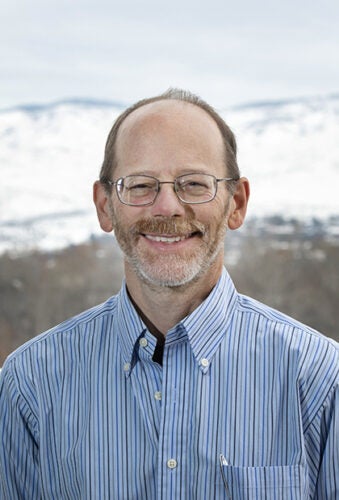
Matt Kohn, a university distinguished professor in the Department of Geosciences, is the 2019 recipient of the Dana Medal. This international award, given by the Mineralogical Society of America, recognizes an outstanding scientist each year for his or her original research in mineralogical sciences.
Kohn’s research, begun as a graduate student at Rensselaer Polytechnic Institute, focuses on mountain range tectonics, or “what happens when plates collide,” he said, by studying the chemistry and ages of metamorphic minerals. His current work is in the western Italian Alps and along the Himalayan mountain range.
Kohn’s research has a second focus, using the geochemistry of fossils, snow and plants to understand climates and ecosystems. He is studying today’s water resources in Southern Idaho and ancient climates and ecosystems in different parts of the U.S. and South America.
“We are trying to understand how snow packs deliver water to soils and help plants take up that water from the soils,” said Kohn.
In working in both metamorphic petrology and climate-related research, Kohn is unique among scientists.
“Geoscientists don’t understand how I can work in fields that are so different from one another,” he said, “but it’s all about the chemistry of different Earth materials.”
Ultimately, Kohn wants his students to leave his classes understanding that earth is a dynamic place.
“When we talk about how slowly tectonic plates move, it doesn’t seem like much is going on. But the record is phenomenal. And it doesn’t hurt that the rocks these processes create are spectacular,” he said. He cited the chemistry of garnets as just one example.
“Garnets grow like an onion with many layers,” said Kohn. “The chemistry in each layer changes as the rock is moving around in the earth’s crust. Garnets record a whole evolution of pressures and temperatures.”
Kohn grew up in Eastern Tennessee in the foothills of the Appalachian Mountains. The proximity of the range – he could find marine fossils in his own back yard – combined with his love for the outdoors, and the influence of his father’s interest in minerals and lapidary work, helped spark his scientific pursuits. Before his graduate work at Rensselaer Polytechnic Institute, Kohn studied geology at the Massachusetts Institute of Technology. He began teaching at Boise State in 2007.
He received the news that he had won the Dana Medal at a recent meeting of the Geological Society of America. He is delighted, but modest.
“It’s one of those things where you look at the list of the people who have received this honor. They’re such fantastic scientists. You wonder if MSA is talking to the right person,” he said.
The award is a recognition of Kohn’s original work and a coup for the university, said James McNamara, a professor and department chair in the Department of Geosciences.
“We are proud to see Dr. Kohn recognized for his outstanding achievements in research. When our scientists receive awards like the Dana Medal, which goes to the very top scientists in the discipline, it indicates that Boise State is a world-class research institution and that the investments in research and graduate education that Boise State has made have been fruitful.”
Kohn will receive an engraved medal in 2019. He will also become a Life Fellow of the Mineralogy Society, and give a scientific presentation that will be published in American Mineralogist.